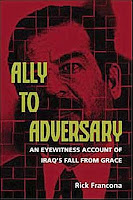 |
| Convicted spy Jonathan Pollard |
President Barack Obama will make his first visit as president to Israel in March, assuming Prime Minister Benjamin Netanyahu can form a coalition to govern the country. According to the Israeli media, Israeli President Shimon Peres will make yet another request for the release of admitted and convicted spy Jonathan Pollard "on humanitarian grounds."
Pollard, a U.S. Navy intelligence analyst, was convicted in 1987 of espionage against the United States on behalf of Israel. He was sentenced - as he should have been - to life in prison, but because of laws in existence at the time, he will be eligible for parole and may be released on November 21, 2015.
Almost a year ago, Shimon Peres made the same request. Prior to a trip during which he was awarded America's highest civilian award, the Presidential Medal of Freedom, the Israeli president requested that President Obama release the convicted traitor. I wrote about that request - and the correct response, a refusal, from Mr. Obama. See Obama, Peres and Pollard - any "flexibility?"
Shimon Peres is an honorable man who has served his country in a continuous series of military, political and diplomatic positions that mirror the creation and development of the Jewish state. To have this icon of Israeli history grovel for the release of a traitor should be embarrassing for the people of Israel. A paragon of honor asking for the release of a spy - not exactly the legacy he would want. It is hard to believe the government of Israel wants one of its most respected citizens to compromise his standards to be associated with the ilk that is Jonathan Pollard.
Israeli requests for Pollard's release are nothing new. I am conflicted by the Israelis' continuous requests to excuse Pollard's treason. The intelligence officer in me respects the Israelis' desire to stand by a recruited spy who worked for them, while the American military officer in me would have supported the death penalty against a traitor whose perfidy may have led to the deaths of people who we, American intelligence, had recruited to work for us. It is a haunting duality. Do the Israelis really want to insult the only real ally they have?
What has changed in less than a year? For one, President Obama has been re-elected, and as such, may have what he believes is more "flexibility." He pointed this out to Russian President Dmitry Medvedev when discussing America's European-based missile defense system, that he will have more "flexibility" after the 2012 election.
What does this mean for Jonathan Pollard? President Obama's self-ascribed flexibility might just be the key to Pollard's early release. It is no secret that Barack Obama is not highly regarded in Israel - no wonder, he has done very little to engender confidence that his declared support for the Jewish state is genuine.
A decision by President Obama to pardon Jonathan Pollard might be the one gesture that would endear him to the Israeli people. I hope the President does not take this step, in effect placing political expediency above doing the right thing. You may take from that phrase that I believe Jonathan Pollard should rot in that jail cell - he did the crime, he is doing the time.
A presidential pardon for Jonathan Pollard would be an insult to those of us who have conducted intelligence operations on behalf of our country. That said, I am not confident that this president is above playing politics at the expense of propriety.
To my Israeli friends: I know we disagree vehemently on this issue. I will not change my mind, nor will I get involved in a drawn-out discussion when we are unlikely to resolve our differences. This is my view - you are free to voice your own. I just will not respond.














.jpg)
